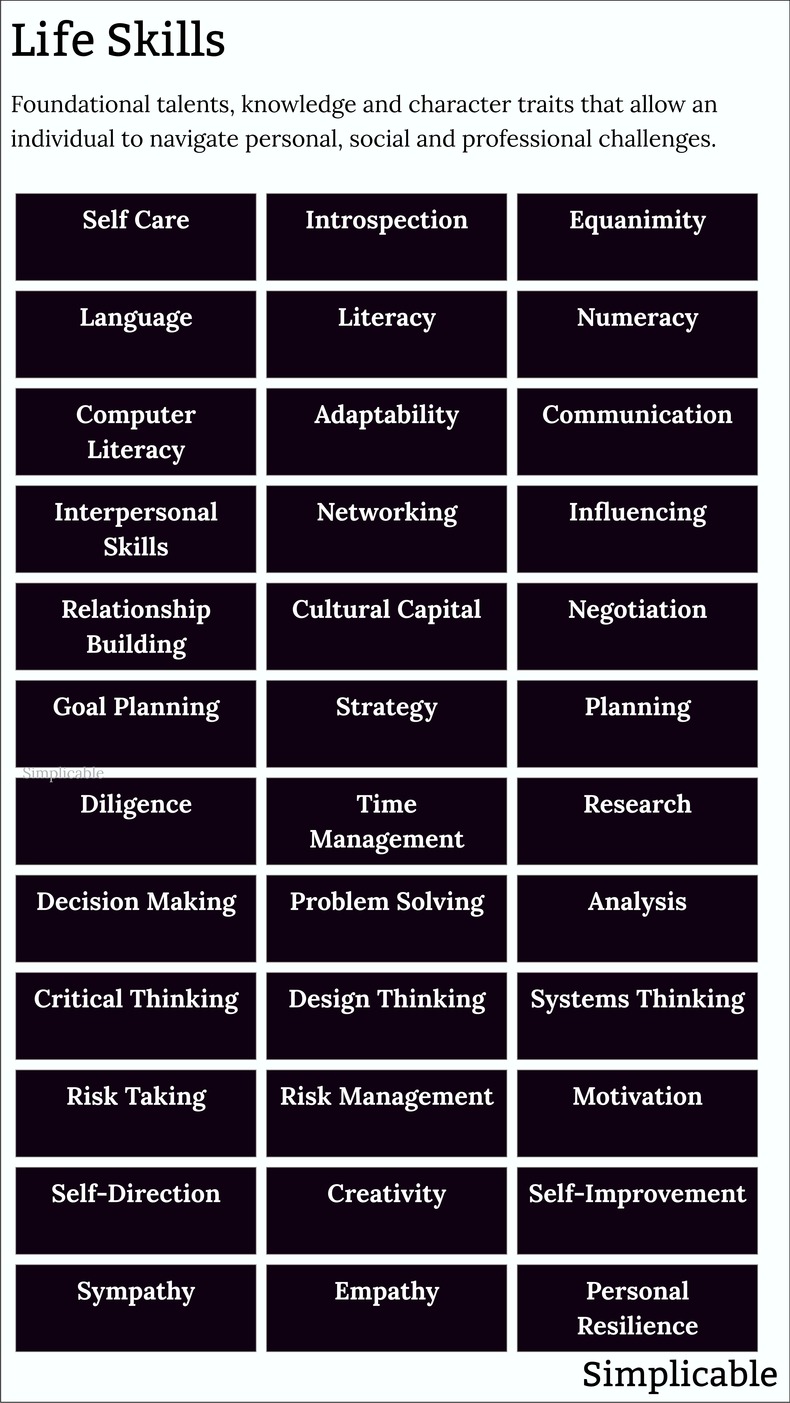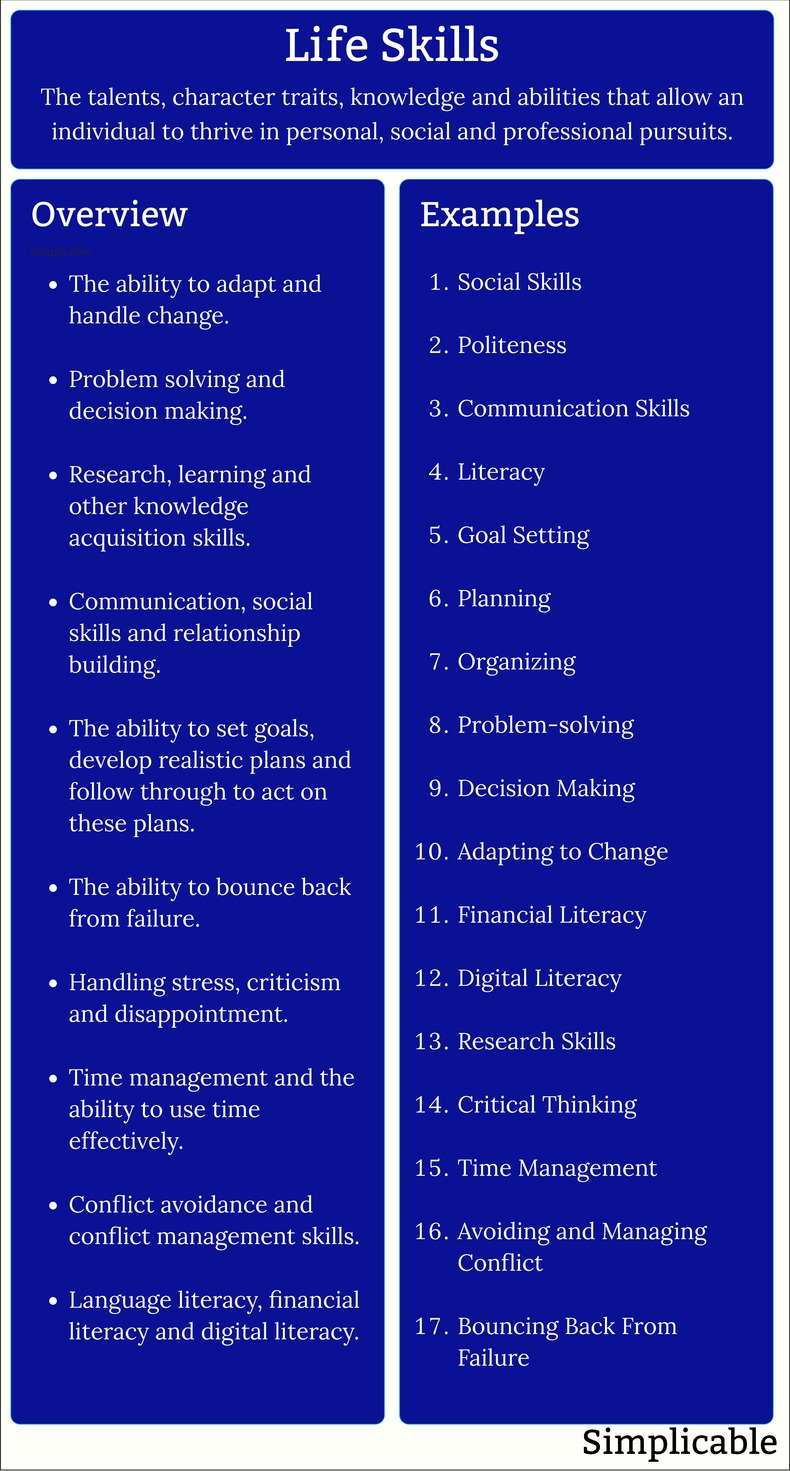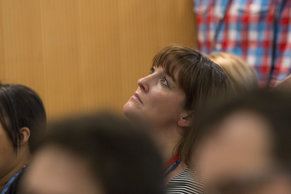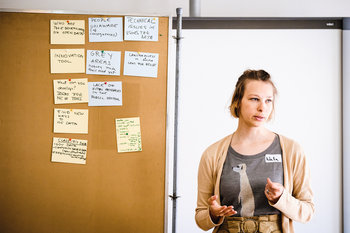
Self Care
The process of self-managing your mental, emotional, and physical health. This includes basic needs such as sleep, healthy food, cleanliness and prevention of disease. For example, a student who goes for a jog each day to improve their physical health and emotional well-being.Introspection
Introspection is the ability to understand your own behavior, character and thoughts. For example, the ability to recognize that a negative thought is due to your current mood such that it will pass.Equanimity
The ability to remain calm and composed such that your emotions and behavior remain in a reasonable range whatever should happen. For example, an individual who is relatively unaffected by the negativity of others such that their mood and behavior can't be easily derailed.Language
The ability to communicate effectively in your native language. Second languages are also a significant life skill that can open a wide range of opportunities and modes of thinking.Literacy
Reading and writing proficiency in your native language.Numeracy
Understanding and applying basic numerical concepts and operations, particularly addition, subtraction, multiplication and division. More advanced mathematics such as a solid understanding of statistics is also an advantage in life.Computer Literacy
The ability to be productive with computerized devices. This has become a life skill as computers such as smart phones are a pervasive aspect of modern life.Adaptability
As change is constant and often beneficial, it is a skill to be able to respond to change in an effective way or perhaps lead change. For example, a mid-career professional who recognizes declining demand for their skills and moves to acquire new skills to stay relevant to their employer and industry.Communication
The ability to listen and to express yourself with words and visual communication.Interpersonal Skills
Social skills that allow an individual to participate in social processes such as friendship.Networking
The process of meeting new people.Influencing
Influencing the thoughts, emotions, behaviors and decisions of others. For example, the ability to convince an interviewer that you're the best person for a job.Relationship Building
Relationship building is the process of building social relationships including friendships, family and professional relationships.Cultural Capital
Cultural capital is the ability to influence within the context of a culture. For example, a New Yorker who has lived in the city for a long time such that they know how to deal with other New Yorkers.Negotiation
Negotiation is the process of developing agreements with others that have favorable terms. For example, an ability to negotiate with a neighbor who has a complaint to develop a solution that is win-win.Goal Planning
The ability to identify worthy and achievable goals and to prioritize them.Strategy
Developing realistic plans to achieve goals in an environment of competition and constraint. For example, a student who identifies a path of learning and experience that will qualify them for their desired profession.Planning
Identifying and sequencing the actions and resources that are required to execute strategy. For example, a student who identifies an achievable plan to improve their marks to get into a reasonably good university.Diligence
The ability to focus on thought processes and work to do things with care. For example, a ticket agent at a train station who listens carefully to customer requests and works to fulfill the requests accurately. Diligence is a basis for productivity.Time Management
Time management is the process of using time effectively. For example, two students of equal ability where one learns 20 concepts an hour and the other learns 20 concepts in a year due to differences in study habits.Research
Discovering and validating information including the validity of sources.Decision Making
The ability to make reasonable decisions in a timely manner.Problem Solving
Solving problems in an effective and efficient way. For example, a talent for identifying the root cause of problems.Analysis
Analysis is an ability to break information into its component parts in order to understand it better. For example, taking a machine apart to try to understand why it is malfunctioning.Critical Thinking
The ability to develop a reasonable and informed opinion and defend it. For example, the ability to explain in a convincing way why you think a film was brilliant or flawed.Design Thinking
The process of solving problems with design. For example, a student who designs a useful system for memorizing vocabulary in a second language using mnemonics.Systems Thinking
Systems thinking is the process of considering the broad end-to-end impact of things. For example, considering the unintended consequences of actions.Risk Taking
The process of taking calculated risks is a basic requirement for doing anything in life.Risk Management
Risk management is the process of due diligence and control that ensures that risk taking is likely to be advantageous. For example, a skier who identifies common dangers of the sport and takes reasonable steps to stay safe.Motivation
Your drive to do things in a directed way towards goals.Self-Direction
The habit of finding your own path without anyone providing instructions or feedback. For example, an employee who feels confident to solve problems that are beyond the scope of policy, process, procedure and training.Creativity
The ability to develop non-obvious value. For example, an artist who leaps ahead of their peers to develop their own style without relying on emulating others.Self-Improvement
The habit of identifying your strengths, weaknesses, opportunities and threats to self-improve on a continual basis. For example, an individual who thinks about the failures of each day to visualize how things could have been handled better.Sympathy
A talent for understanding how others are feeling to act in some appropriate way. For example, recognizing when a family member is experiencing negative emotions to help them or give them space. A basic interpersonal skill.Empathy
The ability to share emotion with others. For example, the ability to be genuinely happy to see another person succeed at something. A basic building block of healthy relationships.Personal Resilience
Personal resilience is the ability to handle stress without derailing your well-being and productivity. For example, handling criticism at work without loss of enthusiasm and confidence.Summary
Life skills are the foundational capacities and talents that allow individuals to thrive in personal, social and professional pursuits.
Discussion
Some of the items above are arguably personality traits as opposed to skills. For example, motivation may be considered an element of character. However, individuals may also cultivate a skill to generate motivation in themselves.| Overview: Life Skills | ||
Type | ||
Definition | Foundational skills that improve an individual's prospects for a happy, productive and fulfilling life. | |
Related Concepts | ||










































